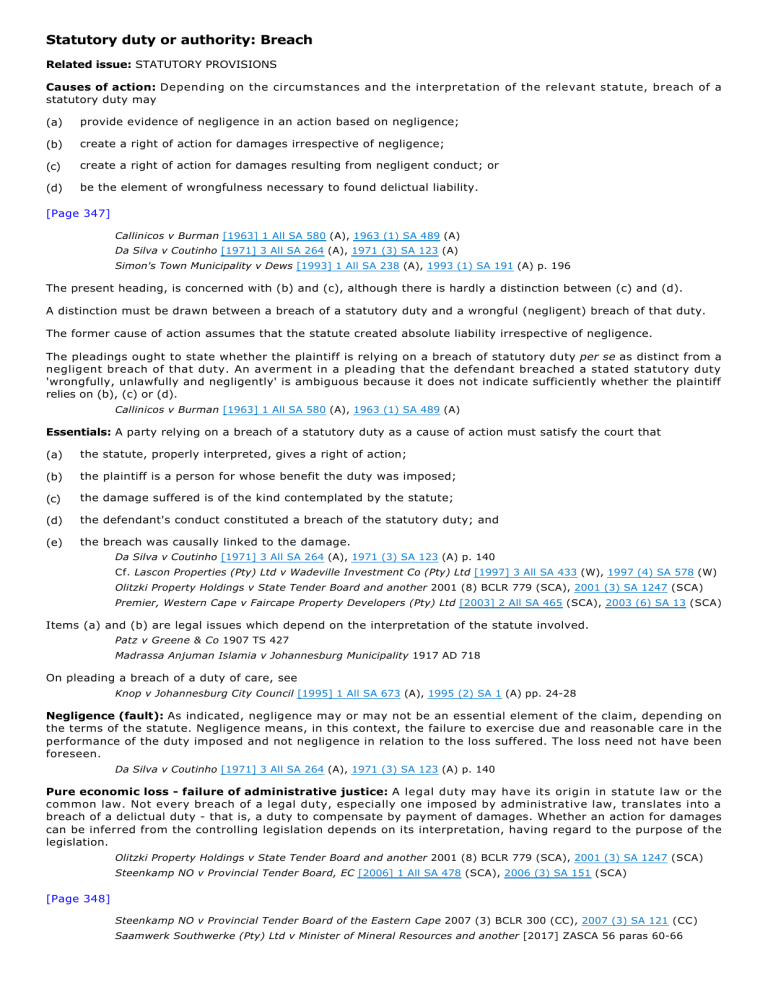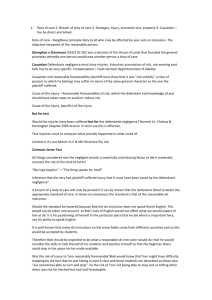
Statutory duty or authority: Breach Related issue: STATUTORY PROVISIONS Causes of action: Depending on the circumstances and the interpretation of the relevant statute, breach of a statutory duty may (a) provide evidence of negligence in an action based on negligence; (b) create a right of action for damages irrespective of negligence; (c) create a right of action for damages resulting from negligent conduct; or (d) be the element of wrongfulness necessary to found delictual liability. [Page 347] Callinicos v Burman [1963] 1 All SA 580 (A), 1963 (1) SA 489 (A) Da Silva v Coutinho [1971] 3 All SA 264 (A), 1971 (3) SA 123 (A) Simon's Town Municipality v Dews [1993] 1 All SA 238 (A), 1993 (1) SA 191 (A) p. 196 The present heading, is concerned with (b) and (c), although there is hardly a distinction between (c) and (d). A distinction must be drawn between a breach of a statutory duty and a wrongful (negligent) breach of that duty. The former cause of action assumes that the statute created absolute liability irrespective of negligence. The pleadings ought to state whether the plaintiff is relying on a breach of statutory duty per se as distinct from a negligent breach of that duty. An averment in a pleading that the defendant breached a stated statutory duty 'wrongfully, unlawfully and negligently' is ambiguous because it does not indicate sufficiently whether the plaintiff relies on (b), (c) or (d). Callinicos v Burman [1963] 1 All SA 580 (A), 1963 (1) SA 489 (A) Essentials: A party relying on a breach of a statutory duty as a cause of action must satisfy the court that (a) the statute, properly interpreted, gives a right of action; (b) the plaintiff is a person for whose benefit the duty was imposed; (c) the damage suffered is of the kind contemplated by the statute; (d) the defendant's conduct constituted a breach of the statutory duty; and (e) the breach was causally linked to the damage. Da Silva v Coutinho [1971] 3 All SA 264 (A), 1971 (3) SA 123 (A) p. 140 Cf. Lascon Properties (Pty) Ltd v Wadeville Investment Co (Pty) Ltd [1997] 3 All SA 433 (W), 1997 (4) SA 578 (W) Olitzki Property Holdings v State Tender Board and another 2001 (8) BCLR 779 (SCA), 2001 (3) SA 1247 (SCA) Premier, Western Cape v Faircape Property Developers (Pty) Ltd [2003] 2 All SA 465 (SCA), 2003 (6) SA 13 (SCA) Items (a) and (b) are legal issues which depend on the interpretation of the statute involved. Patz v Greene & Co 1907 TS 427 Madrassa Anjuman Islamia v Johannesburg Municipality 1917 AD 718 On pleading a breach of a duty of care, see Knop v Johannesburg City Council [1995] 1 All SA 673 (A), 1995 (2) SA 1 (A) pp. 24­28 Negligence (fault): As indicated, negligence may or may not be an essential element of the claim, depending on the terms of the statute. Negligence means, in this context, the failure to exercise due and reasonable care in the performance of the duty imposed and not negligence in relation to the loss suffered. The loss need not have been foreseen. Da Silva v Coutinho [1971] 3 All SA 264 (A), 1971 (3) SA 123 (A) p. 140 Pure economic loss ­ failure of administrative justice: A legal duty may have its origin in statute law or the common law. Not every breach of a legal duty, especially one imposed by administrative law, translates into a breach of a delictual duty ­ that is, a duty to compensate by payment of damages. Whether an action for damages can be inferred from the controlling legislation depends on its interpretation, having regard to the purpose of the legislation. Olitzki Property Holdings v State Tender Board and another 2001 (8) BCLR 779 (SCA), 2001 (3) SA 1247 (SCA) Steenkamp NO v Provincial Tender Board, EC [2006] 1 All SA 478 (SCA), 2006 (3) SA 151 (SCA) [Page 348] Steenkamp NO v Provincial Tender Board of the Eastern Cape 2007 (3) BCLR 300 (CC), 2007 (3) SA 121 (CC) Saamwerk Southwerke (Pty) Ltd v Minister of Mineral Resources and another [2017] ZASCA 56 paras 60­66 [I]n cases of pure economic loss the question will always be whether considerations of public or legal policy dictate that delictual liability should be extended to loss resulting from the conduct at issue. Thus understood, it is hard to think of any reason why the fact that the loss was caused by dishonest (as opposed to bona fide negligent) conduct, should be ignored in deciding the question. We do not say that dishonest conduct will always be wrongful for the purposes of imposing liability, but it is difficult to think of an example where it will not be so. Minister of Finance and others v Gore NO [2007] 1 All SA 309 (SCA), 2007 (1) SA 111 (SCA) para. 87 Odinfin (Pty) Ltd v Reynecke 2018 (1) SA 153 (SCA) Causation: The breach need not be the sole cause of the damage but must have contributed materially thereto. Da Silva v Coutinho [1971] 3 All SA 264 (A), 1971 (3) SA 123 (A) p. 141 PRECEDENTS Claim ­ based on breach of a statutory duty 1. Defendant is the trustee of the insolvent estate of [name]. 2. The insolvent was, at all material times, indebted to plaintiff [amount] for rent in respect of the premises situate at [address] leased by plaintiff to the insolvent in terms of a written agreement [detail and annex copy]. 3. On [date], plaintiff filed with defendant a claim which included a preferent claim for rent in respect of the premises [amount]. 4. The claim was duly admitted by defendant. 5. The proceeds of the property subject to plaintiff's legal hypothec for rent were sufficient to pay the preferent claim. 6. Upon admitting plaintiff's claim, it became defendant's duty to apply the proceeds of the property subject to plaintiff's legal hypothec in satisfying the claim for rent amounting to [amount] in terms of the provisions of section 95 o f Insolvency Act 24 of 1936. 7. Despite the foregoing, defendant wrongfully, negligently and in breach of his legal duty failed to apply the proceeds for the payment of plaintiff's claim but treated plaintiff's claim as a concurrent claim and tendered her [amount] in respect of her claim. 8. Defendant filed a final account in the estate which was confirmed on [date]. Thereafter, defendant distributed the difference to creditors, leaving only [amount] available for payment of plaintiff's claim in terms of the account. 9. Plaintiff alleges that, by reason of defendant's negligent breach of duty, she sustained damages amounting to [Rx] for which defendant is, in his personal capacity, liable to her. 10. Defendant was negligent in that he (a) failed to have regard to the provisions of section 95 of Insolvency Act 24 of 1936; (b) failed to peruse plaintiff's claim properly; (c) failed to act as a reasonable trustee would have acted in the circumstances. [Based on Callinicos v Burman [1963] 1 All SA 580 (A), 1963 (1) SA 489 (A). For a further precedent, see Kommissaris van Binnelandse Inkomste v Willers 1994 (3) SA 283 (A).]

